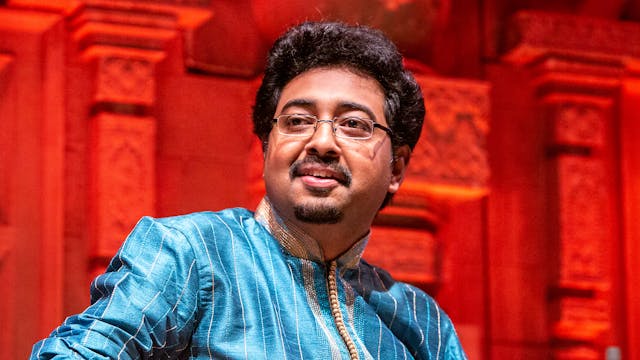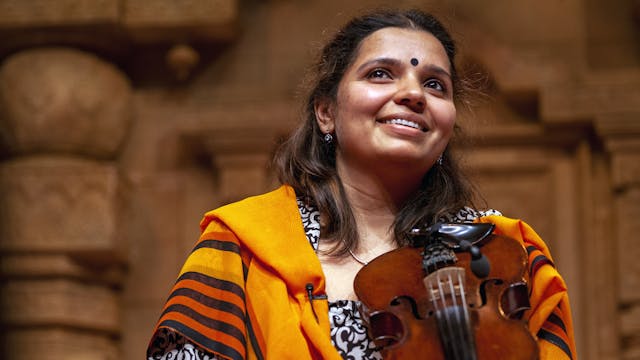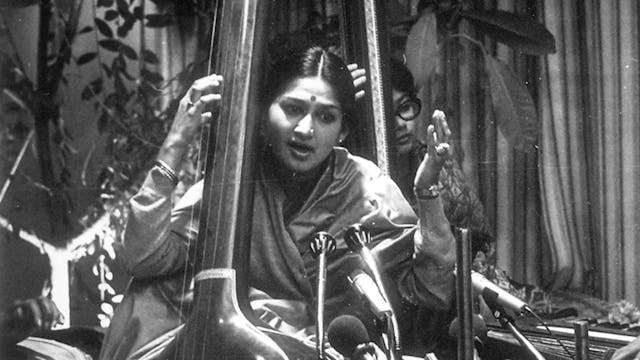Pandit Bharat Bhushan Goswami | Interview
Interviews
•
12m
Interviewed at the LOFT, UK
Musician:
- Pandit Bharat Bhushan Goswami (sarangi)
Born in the enchanting city of Mathura in northern India which is known as the abode of Lord Krishna, Pandit Bharat Bhushan Goswami has scaled ranks to become one of India’s most coveted sarangi players today. This short interview showcases his interesting take on classical music in the contemporary world and what music as a way of life means to him.
The sarangi, a thick, short-necked and fretless bowed instrument from northern India carries strains in the folk instruments and music of the gypsies of the Sahara Desert and also the bowed rebab that traveled to India with the Persians during the 14th and 15th centuries. Its tone being closest to that of a human voice makes it’s sound forbiddingly haunting. The gut strings of the sarangi which need to be glided with the cuticles to produce sound, makes it all the more a painful and difficult instrument to play.
Pandit Goswami started learning vocal music as a child from his grandfather, Pandit Anmol Chand Goswami. But his heart was fixated on the sarangi, which he started playing on his own, picking up a lesson or two from his grandfather and the local musicians in Mathura. Thereafter, he went on to learn from Pandit Kanhaiya Lal Ji in his hometown. Music drew him to Varanasi, where he learned from the legendary sarangi player, Pandit Hanuman Prasad Mishra (1913-1999). His association with Pandits Rajan (1951-2021) and Sajan Mishra further enriched his musical journey and put him on a global platform where he was showcased as an accompanist alongside the greatest musicians as well as a soloist.
In this free-wheeling chat, Pandit Goswami describes his values as a musician. He did not have a godfather nor was the instrument handed down to him as family heirloom. All he had was his deep love and urge to embrace it despite the difficulties strewn in his path. With unrelenting conviction, he claims that there is no way his listeners cannot enjoy his music because he himself is so happily immersed in it. “My tranquil heart stands testimony to the fact that I am happy within and the same emanates through my music,” he says.
As an old-timer, he also voices his concern for the continuity of this art in the midst of raging popular music forms, but not without accolading those from the present generation who have seriously taken up this instrument today.
Up Next in Interviews
-
Abhisek Lahiri | Sarod Talk
Recorded at Darbar Festival 2015, at the Southbank Centre, London.
Musician:
- Abhisek Lahiri (sarod)Raag Bhimpalasi; Thaat: Kafi; Samay: Afternoon
Strumming up a melodious alap on Raag Bhimpalasi, sarod player Abhisek Lahiri talks to Darbar about his childhood, his musical values and why he ...
-
Kala Ramnath | Interview
Kala Ramnath interview from Darbar Festival 2006
- Kala Ramnath (Carnatic Violin)
- Dharambir Dhadyalla MBE (host) -
Shubha Mudgal | Interview
Shubha Mudgal (Gwalior gharana)
“My gurus...were all liberal thinkers and avid collectors of knowledge. They believed in learning from as many sources as possible and I think it is their eclecticism that influenced me as well as their other students.” (Shubha Mudgal)
Shubha Mudgal sings a disti...



